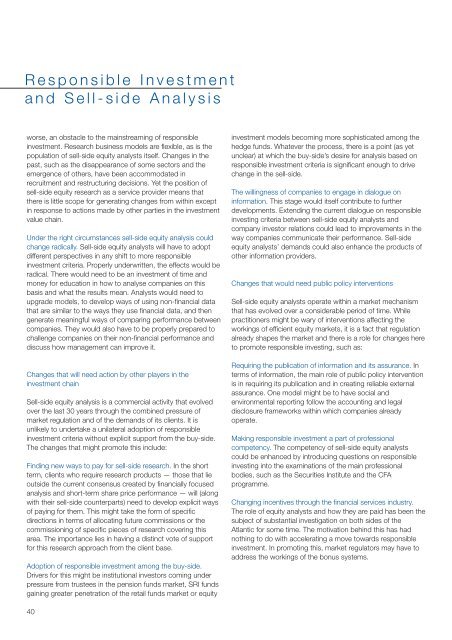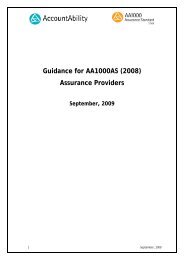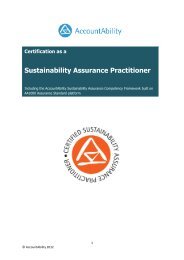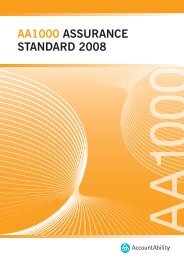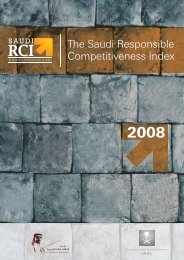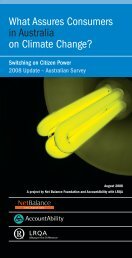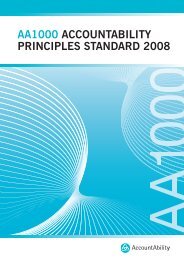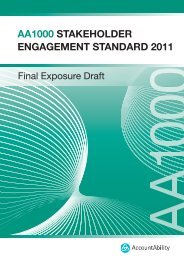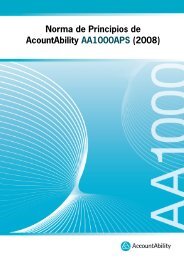Mainstreaming Responsible Investment - AccountAbility
Mainstreaming Responsible Investment - AccountAbility
Mainstreaming Responsible Investment - AccountAbility
You also want an ePaper? Increase the reach of your titles
YUMPU automatically turns print PDFs into web optimized ePapers that Google loves.
<strong>Responsible</strong> <strong>Investment</strong><br />
and Sell-side Analysis<br />
worse, an obstacle to the mainstreaming of responsible<br />
investment. Research business models are flexible, as is the<br />
population of sell-side equity analysts itself. Changes in the<br />
past, such as the disappearance of some sectors and the<br />
emergence of others, have been accommodated in<br />
recruitment and restructuring decisions. Yet the position of<br />
sell-side equity research as a service provider means that<br />
there is little scope for generating changes from within except<br />
in response to actions made by other parties in the investment<br />
value chain.<br />
Under the right circumstances sell-side equity analysis could<br />
change radically. Sell-side equity analysts will have to adopt<br />
different perspectives in any shift to more responsible<br />
investment criteria. Properly underwritten, the effects would be<br />
radical. There would need to be an investment of time and<br />
money for education in how to analyse companies on this<br />
basis and what the results mean. Analysts would need to<br />
upgrade models, to develop ways of using non-financial data<br />
that are similar to the ways they use financial data, and then<br />
generate meaningful ways of comparing performance between<br />
companies. They would also have to be properly prepared to<br />
challenge companies on their non-financial performance and<br />
discuss how management can improve it.<br />
Changes that will need action by other players in the<br />
investment chain<br />
Sell-side equity analysis is a commercial activity that evolved<br />
over the last 30 years through the combined pressure of<br />
market regulation and of the demands of its clients. It is<br />
unlikely to undertake a unilateral adoption of responsible<br />
investment criteria without explicit support from the buy-side.<br />
The changes that might promote this include:<br />
Finding new ways to pay for sell-side research. In the short<br />
term, clients who require research products — those that lie<br />
outside the current consensus created by financially focused<br />
analysis and short-term share price performance — will (along<br />
with their sell-side counterparts) need to develop explicit ways<br />
of paying for them. This might take the form of specific<br />
directions in terms of allocating future commissions or the<br />
commissioning of specific pieces of research covering this<br />
area. The importance lies in having a distinct vote of support<br />
for this research approach from the client base.<br />
Adoption of responsible investment among the buy-side.<br />
Drivers for this might be institutional investors coming under<br />
pressure from trustees in the pension funds market, SRI funds<br />
gaining greater penetration of the retail funds market or equity<br />
investment models becoming more sophisticated among the<br />
hedge funds. Whatever the process, there is a point (as yet<br />
unclear) at which the buy-side’s desire for analysis based on<br />
responsible investment criteria is significant enough to drive<br />
change in the sell-side.<br />
The willingness of companies to engage in dialogue on<br />
information. This stage would itself contribute to further<br />
developments. Extending the current dialogue on responsible<br />
investing criteria between sell-side equity analysts and<br />
company investor relations could lead to improvements in the<br />
way companies communicate their performance. Sell-side<br />
equity analysts’ demands could also enhance the products of<br />
other information providers.<br />
Changes that would need public policy interventions<br />
Sell-side equity analysts operate within a market mechanism<br />
that has evolved over a considerable period of time. While<br />
practitioners might be wary of interventions affecting the<br />
workings of efficient equity markets, it is a fact that regulation<br />
already shapes the market and there is a role for changes here<br />
to promote responsible investing, such as:<br />
Requiring the publication of information and its assurance. In<br />
terms of information, the main role of public policy intervention<br />
is in requiring its publication and in creating reliable external<br />
assurance. One model might be to have social and<br />
environmental reporting follow the accounting and legal<br />
disclosure frameworks within which companies already<br />
operate.<br />
Making responsible investment a part of professional<br />
competency. The competency of sell-side equity analysts<br />
could be enhanced by introducing questions on responsible<br />
investing into the examinations of the main professional<br />
bodies, such as the Securities Institute and the CFA<br />
programme.<br />
Changing incentives through the financial services industry.<br />
The role of equity analysts and how they are paid has been the<br />
subject of substantial investigation on both sides of the<br />
Atlantic for some time. The motivation behind this has had<br />
nothing to do with accelerating a move towards responsible<br />
investment. In promoting this, market regulators may have to<br />
address the workings of the bonus systems.<br />
40


